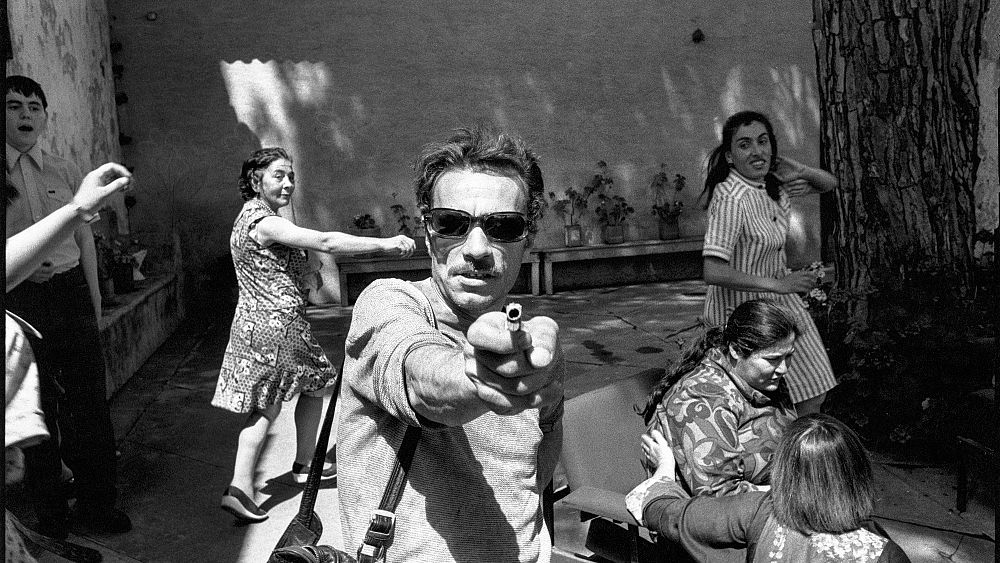
Five photographers, five ways of seeing the city of Palermo, Sicily.
From the nostalgic 1950s to the turbulent year of the 1980s, these photographs offer a profound glimpse into the evolution of a city plagued by social unrest and yet brimming with hope.
The exhibition titled, ‘Palermo Mon Amour’, features the work of Enzo Sellerio, Letizia Battaglia, Franco Zecchin, Fabio Sgroi, and Lia Pasqualino, who have all artfully documented Palermo’s essence through their distinct lenses.
Palermo, a city of contrasts, is portrayed in a variety of ways, from the gentle and playful to the cultured and anti-rhetorical.
These photographs, curated by Valentina Greco and hosted by the Fondazione Merz in Turin, offer an acute testimony to the social landscape of the 1950s and 1960s, reflecting the intricate web of poverty and decay that coexisted with the anticipation of a brighter future.
Yet, Palermo’s resilience was further tested in the ensuing years. The 1970s and 80s brought forth daily acts of ferocity, while the city stood witness to punk movements, student demonstrations, and a complex political climate. Amidst the chaos, there was a glimmer of hope, an opportunity for change.
In the 1950s, Palermo, the capital city of Sicily, Italy, was undergoing a period of profound social and economic transformation.
Coming out of the aftermath of World War II, the city was in the process of rebuilding and recovering from the devastating impact of the war.
The city’s economy began to diversify, with industries such as manufacturing, textiles, and agriculture playing a vital role in driving the local economy.
However, despite these positive developments, Palermo still faced challenges, including poverty, unemployment and socioeconomic disparities.
The city also witnessed the rise of various political ideologies and factions, including the presence of organised crime groups such as the Sicilian Mafia, known as Cosa Nostra, which exerted influence over the city’s social fabric.
During the 1960s and 1970s, Palermo experienced a surge in population due to migration from rural areas of Sicily.
The city struggled to accommodate the growing population, resulting in rapid urbanisation and the development of informal settlements on the outskirts.
Social and political unrest was prevalent during this time, with protests and demonstrations against various issues, including economic inequality and corruption.
The 1980s were a very turbulent period for Palermo. The Mafia’s influence and criminal activities escalated, leading to an increase in violence and organised crime-related incidents. High-profile assassinations and bombings occurred, targeting individuals involved in anti-Mafia efforts, such as judges, prosecutors, and activists.
Most notably, Piersanti Mattarella, the President of the Sicilian Region, was assassinated by the Mafia in 1980.
The 1990s marked a turning point in the fight against the Mafia in Palermo.
On 23 May 1992, a powerful explosion occurred on the highway between Palermo and the town of Capaci, resulting in the deaths of several people, including the renowned Italian judge Giovanni Falcone, his wife Francesca Morvillo, and their three bodyguards.
Falcone was a prominent magistrate who had been leading the fight against the Cosa Nostra.
The attack shocked the nation and sparked public outrage against the Mafia’s influence and control over various aspects of Italian society.
It also galvanised the government and law enforcement agencies to intensify their efforts to combat organised crime.
This period witnessed significant trials against prominent Mafia members, leading to their convictions and dismantling of key criminal networks.
‘Palermo Mon Amour’ is housed within the walls of the Foundation Merz in Turin until 24 September 2023.
THE ROTTEN FISH: CAN OF WORMS OPENED OF APC & TINUBU'S GOVERNMENT OVER NIGERIA'S ECONOMIC DOWNTURN
WATCH THE CRITICAL ANALYSIS AND KNOW THE RESPONSIBLE PARTIES TO BLAME FOR NIGERIA'S ECONOMIC CHALLENGES, WHILE CITIZENS ENDURE SEVERE HARDSHIPS.Watch this episode of ISSUES IN THE NEWS on 9News Nigeria featuring Peter Obi's Special Adviser, Dr Katch Ononuju, 9News Nigeria Publisher, Obinna Ejianya and Tinubu Support Group Leader, McHezekiah Eherechi
The economic crisis and hardship in Nigeria are parts of the discussion.
Watch, leave your comments, and share to create more awareness on this issue.
#9NewsNigeria #Nigeria #issuesInTheNews #politics #tinubu THE ROTTEN FISH: CAN OF WORMS OPENED ...
DON'T FORGET TO SUBSCRIBE AND LEAVE YOUR COMMENTS FOR SUBSEQUENT UPDATES
#9newsnigeria #economia #economy #nigeria #government @9newsng
www.9newsng.com
